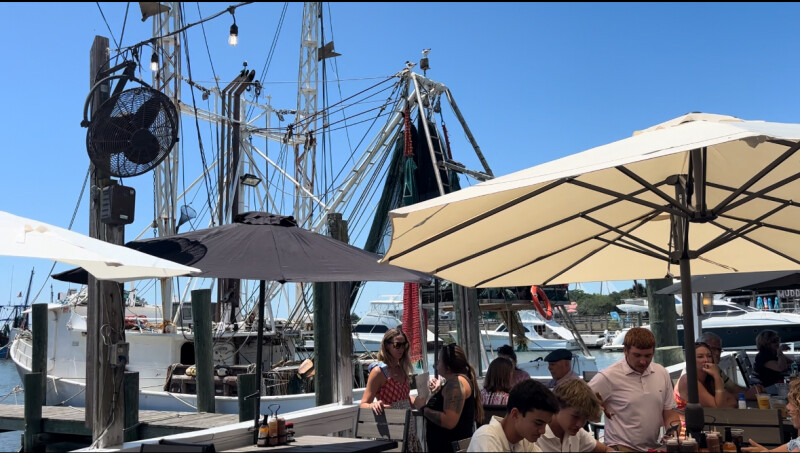The final and perhaps most alarming chapter in the first round of SEAD Consulting’s eight-state seafood fraud investigation has been published, revealing that a staggering 90 percent of Charleston, S.C. restaurants tested were found to be serving imported shrimp, often under the pretense that it was local and wild-caught.
SEAD Consulting, under commission by the Southern Shrimp Alliance, tested shrimp dishes from 44 Charleston restaurants using its patented RIGHTTest (Rapid ID Genetic High-Accuracy Test). The results were jaw-dropping: “only four out of 44 restaurants were found to be serving genuine domestic wild-caught shrimp,” according to SEAD’s press release. The remaining 40 were misrepresenting imported products through menu descriptions, branding, or proximity to local docks. “25 were found to be outright fraudulent.”
“This is not only deceptive but also insulting to the hardworking shrimpers whose livelihoods are being undermined,” said Erin Williams, founder and COO of SEAD Consulting. “It’s decimating the entire regional economy and culture they’ve worked for generations to build and promote.”
Even restaurants overlooking local shrimp boats were found to be using imported product. “Charleston's culinary identity is built on the legacy of local fishermen and the unmatched quality of wild-caught shrimp,” said John Williams, executive director of the Southern Shrimp Alliance. “Consumers — especially tourists — believe they’re eating authentic Lowcountry seafood, when in reality they’re being sold a globalized substitute likely raised in ponds treated with antibiotics, often using slave labor, with none of the tradition or taste.”
SEAD listed four Charleston-area establishments that are confirmed to be serving U.S. wild-caught shrimp:
1. Coosaw Creek Crab Shack 8486 Dorchester Road, North Charleston, SC 29420
2. Grace & Grit (Mount Pleasant) 320 Wingo Way, Suite 100, Mount Pleasant, SC 29464
3. Rappahannock Oyster Bar 701 E Bay Street, Suite 110, Charleston, SC 29403
4. Acme (Lowcountry Kitchen) 31 J C Long Boulevard, Isle of Palms, SC 29451
“These establishments are being publicly recognized for their integrity and commitment to preserving Charleston’s seafood heritage,” SEAD shared.
While other area restaurants may also use local shrimp, SEAD’s testing provides a representative random sampling. The organization plans to send letters to the 40 restaurants found to be using imports, urging them to switch to domestic shrimp or update their menus accordingly. Follow-up testing is also planned.
"Twenty-seven percent of shrimp consumption occurs on a seaside trip or vacation. Visitors are seeking local shrimp, and the vast majority of tested Charleston restaurants are failing to provide it," explained Craig Reaves, SC Director of the Southern Shrimp Alliance. "Our state legislators need to take action like other coastal states to ensure transparent restaurant labeling to help consumers, honest restaurants, and local shrimpers."
Currently, South Carolina has no restaurant labeling law or pending legislation in place. Nationally, the FTC has clarified that a restaurant giving the “net impression” of serving local seafood while actually serving imports is in violation of federal law.
The Charleston findings follow similar reports from Wilmington, North Carolina, and Lake Charles, Louisiana, both of which were investigated earlier this spring. Wilmington shows a 77 percent inauthenticity rate across 44 restaurants, with 25 found to be “explicitly fraudulent.”
Lake Charles offered a rare glimpse of hope. With strong country-of-origin labeling laws and active enforcement, only 5 of 24 restaurants were found to be misleading. “Lake Charles has a 21 percent inauthenticity rate compared to states without labeling laws and enforcement, where the average inauthenticity rate is 78 percent.”
What’s to come
SEAD and the Southern Shrimp Alliance are urging consumers to ask questions when dining out and request proof of shrimp sourcing. They suggest looking for “wild-caught U.S.” or asking directly about local origin. Restaurants, meanwhile, are encouraged to be transparent about their seafood and honor the communities they claim to represent.
“There’s no shame in selling imported shrimp,” said David Williams. “But there’s a big problem when you pretend it’s local. Let consumers decide with the truth.”







